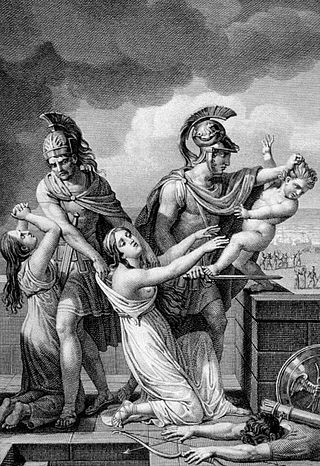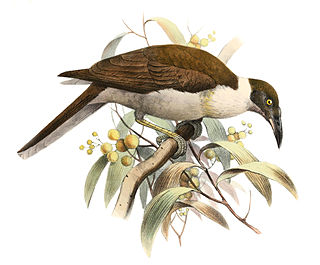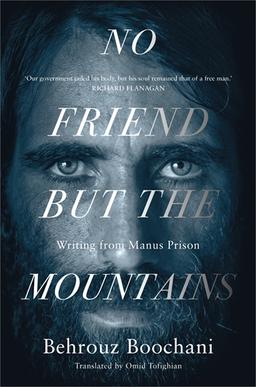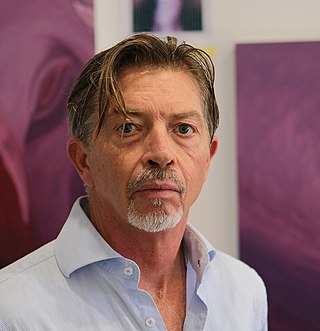
The Trojan Women, also translated as The Women of Troy, and also known by its transliterated Greek title Troades, is a tragedy by the Greek playwright Euripides. Produced in 415 BC during the Peloponnesian War, it is often considered a commentary on the capture of the Aegean island of Melos and the subsequent slaughter and subjugation of its populace by the Athenians earlier that year (see History of Milos). 415 BC was also the year of the scandalous desecration of the hermai and the launch of the Athenians' second expedition to Sicily, events which may also have influenced the author.

Australian immigration detention facilities comprise a number of different facilities throughout Australia, including the Australian territory of Christmas Island. Such facilities also exist in Papua New Guinea and Nauru, namely the Nauru Regional Processing Centre and the Manus Regional Processing Centre.

The Nauru Regional Processing Centre is an offshore Australian immigration detention facility in use from 2001 to 2008, from 2012 to 2019, and from September 2021. It is located on the South Pacific island nation of Nauru and run by the Government of Nauru. The use of immigration detention facilities is part of a policy of mandatory detention in Australia.
10 Days on the Island is a biennial cultural festival held in the island state of Tasmania, Australia.

The Manus friarbird or white-naped friarbird, also known as the chauka is a species of bird in the Honeyeater family, or Meliphagidae. It is endemic to the Manus Province of Papua New Guinea.

Nazanin Boniadi is a British actress and activist. Born in Tehran and raised in London, she went to university in the United States, where she landed her first major acting role as Leyla Mir in the medical drama General Hospital (2007–2009) and its spin-off General Hospital: Night Shift (2007). Since then, Boniadi has played Nora in the sitcom How I Met Your Mother (2011), Fara Sherazi in the spy thriller series Homeland (2013–2014), Esther in the historical drama film Ben-Hur (2016), Clare Quayle in the sci-fi thriller series Counterpart (2017–2018), Zahra Kashani in the action thriller film Hotel Mumbai (2018), and Bronwyn in the fantasy series The Lord of the Rings: The Rings of Power (2022–present).

The Australian government has a policy and practice of detaining in immigration detention facilities non-citizens not holding a valid visa, suspected of visa violations, illegal entry or unauthorised arrival, and those subject to deportation and removal in immigration detention until a decision is made by the immigration authorities to grant a visa and release them into the community, or to repatriate them to their country of origin/passport. Persons in immigration detention may at any time opt to voluntarily leave Australia for their country of origin, or they may be deported or given a bridging or temporary visa. In 1992, Australia adopted a mandatory detention policy obliging the government to detain all persons entering or being in the country without a valid visa, while their claim to remain in Australia is processed and security and health checks undertaken. Also, at the same time, the law was changed to permit indefinite detention, from the previous limit of 273 days. The policy was instituted by the Keating government in 1992, and was varied by the subsequent Howard, Rudd, Gillard, Abbott, Turnbull, Morrison and Albanese Governments. The policy is regarded as controversial and has been criticised by a number of organisations. In 2004, the High Court of Australia confirmed the constitutionality of indefinite mandatory detention of non-citizens. However, this interpretation was overturned in a landmark decision, NZYQ v Minister for Immigration, in 2023, with the High Court concluding the practice was unlawful and unconstitutional.
In feminist theory, kyriarchy is a social system or set of connecting social systems built around domination, oppression, and submission. The word was coined by Elisabeth Schüssler Fiorenza in 1992 to describe her theory of interconnected, interacting, and self-extending systems of domination and submission, in which a single individual might be oppressed in some relationships and privileged in others. It is an intersectional extension of the idea of patriarchy beyond gender. Kyriarchy encompasses sexism, racism, ableism, ageism, antisemitism, Islamophobia, anti-Catholicism, homophobia, transphobia, fatphobia, classism, xenophobia, economic injustice, the prison-industrial complex, colonialism, militarism, ethnocentrism, speciesism, linguicism and other forms of dominating hierarchies in which the subordination of one person or group to another is internalized and institutionalized.
Asylum in Australia has been granted to many refugees since 1945, when half a million Europeans displaced by World War II were given asylum. Since then, there have been periodic waves of asylum seekers from South East Asia and the Middle East, with government policy and public opinion changing over the years.
Reza Barati was a 23-year-old asylum seeker who was killed during rioting at the Manus Island Regional Processing Centre (MIRPC), Papua New Guinea, on 17 February 2014. An Iranian Kurd, he had arrived in Australia on 24 July 2013 – just five days after the PNG solution was announced – and was sent to Manus Island in August.

The Manus Regional Processing Centre, or Manus Island Regional Processing Centre (MIRCP), was one of a number of offshore Australian immigration detention facilities. The centre was located on the PNG Navy Base Lombrum on Los Negros Island in Manus Province, Papua New Guinea.

Behrouz Boochani is a Kurdish-Iranian journalist, human rights defender, writer and film producer living in New Zealand. He was held in the Australian-run Manus Island detention centre in Papua New Guinea from 2013 until its closure in 2017. He remained on the island before being moved to Port Moresby along with the other detainees around September 2019. On 14 November 2019 he arrived in Christchurch on a one-month visa, to speak at a special event organised by WORD Christchurch on 29 November, as well as other speaking events. In December 2019, his one month visa to New Zealand expired and he remained on an expired visa until being granted refugee status in July 2020, at which time he became a Senior Adjunct Research Fellow at the University of Canterbury.

No Friend But the Mountains: Writing from Manus Prison is an autobiographical account of Behrouz Boochani's perilous journey to Christmas Island and his subsequent incarceration in an Australian government immigration detention facility on Manus Island.
Omid Tofighian is an Iranian-Australian philosopher and Honorary Research Associate at the University of Sydney. He is known for his research on ancient Greek philosophy and his translation of the award-winning book by Kurdish-Iranian asylum seeker Behrouz Boochani, No Friend But the Mountains from Persian into English.
Paladin Group, also known as Paladin Solutions, Paladin Holdings and Paladin Solutions Group, is a security and project services contractor which operates in South East Asia, Australia and Oceania.

The Human Rights Law Centre (HRLC) is an Australian human rights group, with locations in South Melbourne and Sydney.
WORD Christchurch is an organisation based in Christchurch, New Zealand which presents a variety of events around books, stories and ideas, most notably the annual WORD Christchurch Festival, also known as WORD Festival, established in 1997, then known as Books and Beyond. Until 2014, the festival was run as the Press Christchurch Writers Festival.

Angus McDonald is an Australian contemporary visual artist, refugee advocate, columnist, and documentary filmmaker.

Hoda Afshar is an Iranian documentary photographer who is based in Melbourne. She is known for her 2018 prize-winning portrait of Kurdish-Iranian refugee Behrouz Boochani, who suffered a long imprisonment in the Manus Island detention centre run by the Australian government. Her work has been featured in many exhibitions and is held in many permanent collections across Australia.
Zanny Begg is an Australian artist-filmmaker. Begg works between documentary and fiction using experimental forms of storytelling to explore hidden and/or contested histories. Begg is a participatory and collaborative artist who has exhibited in multiple exhibitions around the world including the Istanbul Biennale (2010); Taipei Biennial (2008), Sharjah Biennale (2011); and The National New Australian Art (2017). Her work consistently returns to themes of gender, spatial justice and resistance.












